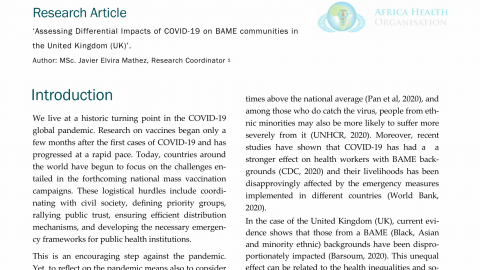Assessing Differential Impacts of COVID-19 on BAME communities in the United Kingdom
Tackling the impact: AHO lead research paper assessing the differential impacts of COVID-19 in the BAME communities in the United Kingdom by AHO Research Coordinator, MSc. Javier Elvira Mathez
The African Health Organization’s mandate aims to secure health for all, supporting research projects around the world addressing the on-going challenges regarding the COVID-19 global pandemic.
There is clear evidence that COVID-19 does not affect all population groups equally. Long-standing systemic health and social inequities have put many people from racial and ethnic minority groups at increased risk of getting sick and dying from COVID-19. Understanding and assessing the differential Impacts of COVID-19 on BAME communities in the UK is a key path to highlighting the factors that may be influencing the impact of the pandemic and strategies for addressing inequalities.
The research paper lead by AHO titled “Assessing Differential Impacts of COVID-19 on BAME communities in the United Kingdom (UK)” outlines a number of key insights into the differential impact of the pandemic: the historical interaction of the social determinants of health (SdH) has driven risk in BAME communities; the uneven effect has resulted in an increased risk of disease and death for minorities; sociohistorical institutional racism, coupled with gender dynamics, has played a significant role in the impacts of the pandemic; and the current and future policy response to the pandemic must take into account the historical sets of inequalities that are significantly correlated with mortality-positivity rates.
Data reviewed for this study indicated that BAME were over-represented among critically ill patients and were at greater risk. Black, Pakistani and Bangladeshi backgrounds are almost twice to three times more likely to fall victim to Covid-19 when compared to other white communities. Moreover, BAME households saw a disproportionate economic, social and emotional impact during the pandemic, and continue to be among the high-risk groups as the pandemic unfolds.
As part of the project, the AHO has developed a novel methodology that aimed to highlight the role of the social determinants of health in the over-representation of BAME household among critically ill or deseeded. Historical trends showed the correlations between the historical social inequalities and the increased risk of COVID-19. Additionally, considering the disenfranchisement of many of these households in the United Kingdom, multiple social determinants of health are expected to worsen during the COVID-19 pandemic and its aftermath: employment, housing, food, education, and health care. Sustained intersectoral engagement and coordination will be the key roadmap for mitigating these deep and complex multi-ethnic inequalities, and for healing from the crisis.
It is undeniable that the pandemic has had a significant impact on all citizens of the United Kingdom. Yet a disproportionate burden has been placed on minorities in the UK, frontline workers, the elderly, and those at the lower end of the social spectrum. COVID-19’s effect has hit all British households, but its impact is far from that of an equalizer. The report emphasizes the urgency to tackle health inequities and the social determinant in the UK, as well socially determined health inequities on the policy agenda and implementation of plans against the pandemic. COVID-19 has placed a spotlight on the inequities of health and the problems associated with viewing health policy in isolation from social factors.
by AHO Research Coordinator, MSc. Javier Elvira Mathez
AHO Press Office, 43 Berkeley Square, London, W1J 5FJ, Tel: 0300 1234 055, email: info@aho.org


